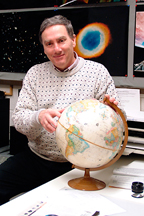 |
Brilliant Blunders:
|
| Drawing on the lives of five renowned scientists, Mario Livio shows how even these geniuses made major mistakes and how their errors were an essential part of the process of achieving scientific breakthroughs. | |
| Dr. Mario Livio Space Telescope Science Institute Dr Mario Livio is a senior astrophysicist and former Head of Science Division at the Space Telescope Science Institute (STScI), the institute which conducts the scientific program of the Hubble Space Telescope. He received his Ph.D. in theoretical astrophysics from Tel Aviv University in Israel, was a professor in the Physics Dept. of the Technion-Israel Institute of technology from 1981 till 1991, and joined STScI in 1991. Dr Livio has published over 400 scientific papers and received numerous awards for research, for excellence in teaching, and for his books. His interests span a broad range of topics in astrophysics, from cosmology to the emergence of intelligent life. Dr Livio has done much fundamental work on the topic of accretion of mass onto black holes, neutron stars, and white dwarfs, as well as on the formation of black holes and the possibility to extract energy from them. |
We all make mistakes. Nobody is perfect. And that includes five of the greatest scientists in history—Charles Darwin, William Thomson (Lord Kelvin), Linus Pauling, Fred Hoyle, and Albert Einstein. But the mistakes that these great luminaries made helped advance science. Indeed, as Mario Livio explains, science thrives on error, advancing when erroneous ideas are disproven. As a young scientist, Einstein tried to conceive of a way to describe the evolution of the universe at large, based on General Relativity—his theory of space, time, and gravity. Unfortunately he fell victim to a misguided notion of aesthetic simplicity. Fred Hoyle was an eminent astrophysicist who ridiculed an emerging theory about the origin of the universe that he dismissively called “The Big Bang.” The name stuck, but Hoyle was dead wrong in his opposition. They, along with Darwin (a blunder in his theory of Natural Selection), Kelvin (a blunder in his calculation of the age of the earth), and Pauling (a blunder in his model for the structure of the DNA molecule), were brilliant men and fascinating human beings. Their blunders were a necessary part of the scientific process. Collectively they helped to dramatically further our knowledge of the evolution of life, the Earth, and the universe. |